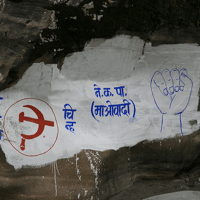Left-wing radicalism in South Asia is stronger than at any time since the Cold War, with both India and Nepal challenged by Maoist uprisings. Because it impacts one of the world's emerging powers, the situation in India is perhaps of greater global significance. But the Nepal case is just as instructive, if not more so.
For Nepal's largely impoverished population of 25 million, which lives in a territory the size of Florida, a bloody decade of people's war has since 2006 given way to "peace." Yet to call the situation in Nepal peace is appropriate only if one believes that Lebanon with Hezbollah and Gaza with Hamas are also at peace. In reality, war continues using other means.
In all three cases, armed insurgent groups continue to use violence and coercion as an integral component of their political activity, while simultaneously exploiting the advantages inherent to nonviolent activities, such as ceasefires or participation in legal activities, to attain access to their opponents' strongholds and destroy democracy from within. This is the face of so-called new war in the 21st century.

